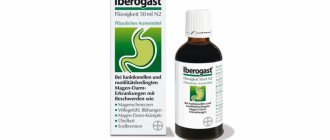Pharmacodynamics and pharmacokinetics
Taking this medication allows you to compensate for the insufficiency of external secretory function in the pancreas. At the same time, it has a proteolytic, amylolytic and lipolytic effect.
The enzymes that make up Pancreatin , namely lipase, alpha-amylase, chymotrypsin and trypsin , help break down proteins into amino acids, fats into fatty acids and glycerol, starch into monosaccharides and dextrins. The functional state of the gastrointestinal tract also improves, and digestive processes are normalized.
Thanks to trypsin, stimulated pancreatic secretion is inhibited, producing an analgesic effect.
In the alkaline environment in the small intestine, pancreatic enzymes are released from the dosage form because they are protected from the influence of gastric juice in the form of a shell.
The manifestation of maximum enzymatic activity occurs 30-45 minutes after oral administration. Pancreatin is not absorbed into the gastrointestinal tract; the substance is excreted along with the feces.
Instructions for medical use of the drug Penzital Gastro
Excipients: lactose, microcrystalline cellulose, sodium starch glycolate, povidone, talc, colloidal silicon dioxide, methacrylic acid copolymer, diethyl phthalate, titanium dioxide.
Description
White, round, biconvex film-coated tablets. Pharmacotherapeutic group: digestive enzyme agent
ATX code: A09AA02
Pharmacological properties
Compensates for insufficiency of exocrine pancreatic function and has proteolytic, amylolytic and lipolytic effects. The enzymes included in pancreatin (lipase, alpha-amylase, trypsin, chymotrypsin) promote the breakdown of proteins into amino acids, fats into glycerol and fatty acids, starch into dextrins and monosaccharides.
Improves the functional state of the gastrointestinal tract, normalizes digestion processes. Trypsin inhibits stimulated pancreatic secretion, producing an analgesic effect.
Pancreatic enzymes are released from the dosage form in the alkaline environment of the small intestine, since they are protected from the action of gastric juice by the membrane. Maximum enzymatic activity is observed 30-45 minutes after oral administration.
Indications for use
Replacement therapy for exocrine pancreatic insufficiency: chronic pancreatitis, pancreatectomy, condition after irradiation, dyspepsia, Roemheld syndrome (gastrocardiac syndrome), cystic fibrosis; flatulence, diarrhea of non-infectious origin.
Impaired digestion of food (condition after resection of the stomach and small intestine); to improve food digestion in persons with normal gastrointestinal function in case of errors in nutrition (eating fatty foods, large amounts of food, irregular meals) and in cases of chewing dysfunction, sedentary lifestyle, prolonged immobilization.
Preparation for X-ray examination and ultrasound of the abdominal organs.
Contraindications
Hypersensitivity to the components of the drug, acute pancreatitis, exacerbation of chronic pancreatitis.
Directions for use and doses
For oral administration. 1-2 tablets before meals, without chewing and with water (water, fruit juices). If necessary, take an additional 2-4 tablets with meals. In cases where higher doses of pancreatin are required, a doctor's consultation is necessary to prescribe a higher dosage depending on the symptoms (for example, reducing the severity of steatorrhea, abdominal pain).
The dose is determined individually depending on the degree of digestive disturbance. Adults usually take 1 - 2 tablets 3 times a day.
In children, the drug is used as prescribed by a doctor.
The duration of treatment can vary from several days (if the digestive process is disrupted due to errors in the diet) to several months or years (if constant replacement therapy is necessary).
Side effect
Allergic reactions. In some cases - diarrhea, constipation, discomfort in the stomach, nausea (the cause-and-effect relationship of the development of these reactions with the action of pancreatin has not been established, since these phenomena refer to symptoms of exocrine pancreatic insufficiency). With long-term use in high doses, the development of hyperuricosuria and an increase in the level of uric acid in the blood plasma is possible. In cystic fibrosis, if the required dose of pancreatin is exceeded, strictures (fibrous colonopathy) may develop in the ileocecal region of the ascending colon.
When using pancreatin in high doses in children, perianal irritation and irritation of the oral mucosa may occur.
Overdose
Symptoms: hyperuricosuria, hyperuricemia. Children are constipated.
Treatment: drug withdrawal, symptomatic therapy.
Interaction with other drugs
With the simultaneous use of pancreatin with iron preparations, the absorption of the latter may be reduced. Concomitant use of antacids containing calcium carbonate and/or magnesium hydroxide may lead to a decrease in the effectiveness of pancreatin.
special instructions
The safety of using pancreatin during pregnancy has not been sufficiently studied. Use is possible in cases where the expected benefit to the mother outweighs the potential risk to the fetus. In cystic fibrosis, the use of pancreatin in high doses is not recommended due to the increased risk of developing strictures (fibrotic colonopathy). The dose should be adequate to the amount of enzymes necessary for the absorption of fats, taking into account the quality and quantity of food consumed.
With long-term use, iron supplements are prescribed simultaneously.
Release form
10 enteric-coated tablets in strips. 1, 2, 3, 4, 5, 6, 7, 8, 9, 10, 11, 12 strips in a cardboard box along with instructions for use.
Storage conditions
At temperatures from +2° to +25°C, in a dry place, out of reach of children.
Best before date
3 years. Do not use after the expiration date stated on the package.
Conditions for dispensing from pharmacies
Over the counter.
Manufacturer
Shreya Life Sciences Pvt. Ltd., India
Send consumer claims to the representative office address: 111033 Moscow, st. Zolotorozhsky Val, 11, building 21 tel.
Indications for use of Penzital
Main indications for use:
- carrying out replacement treatment for exocrine insufficiency in the pancreas, for example, in chronic pancreatitis, pancreatectomy , post -dyspepsia , radiation , Roemheld syndrome or gastrocardial syndrome, cystic fibrosis ;
- diarrhea of non-infectious origin, flatulence ;
- impaired absorption of food, for example, after resection of the small intestine and stomach;
- the need to improve the digestion of food in people with normal gastrointestinal function with errors in nutrition - large amounts of food, fatty foods, irregular meals, as well as chewing dysfunction, a sedentary lifestyle and prolonged immobilization;
- preparation for x-ray examination or ultrasound of internal organs.
Penzital - instructions for use (Method and dosage)
The tablets are intended for oral and are best taken before meals . In this case, ordinary water is suitable for drinking. It is contraindicated to use alkaline liquids for this purpose.
According to the instructions for use of Penzital, dose selection is carried out by a gastroenterologist, who must take into account the patient’s diet and the degree of enzyme deficiency. The average daily dosage for adult patients is: 1-2 tablets 3 times . It is allowed to increase the daily dosage to 16 tablets.
When treating small patients, dose selection is performed individually.
The course of therapy is determined by the attending physician and can last for several years.
Penzital - how to take and dosage of the drug
Penzital relieves the feeling of heaviness in the stomach
Tablets are taken during meals or after. The tablet is swallowed (not chewed) and washed down with natural fruit juice or plain water. The medicine should not be taken with beet juice and alkaline liquids (Essentuki, Borjomi and others).
The dosage of Penzital is selected individually for each patient. The age of the person (adult, child, teenager) and the degree of disturbance in digestion of food are taken into account. In most cases, adult patients with Penzital are prescribed no more than two tablets three times a day. The dosage of the drug is affected by lipase activity. In a healthy person, the daily production rate of water-soluble lipase is 400,000 units. Hence:
- for an adult patient with chronic pancreatic insufficiency, the average daily dose is 150,000 units of lipase activity, which is equivalent to 25 tablets of an enzyme preparation;
- for an adult patient with complete functional pancreatic insufficiency, the average daily dose is equal to up to 400,000 units of lipase activity, which is equivalent to 65 tablets of an enzyme preparation;
- for children under 1.5 months of age, the average daily dose is 50,000 IU of lipase activity, which is equivalent to 8 tablets of Penzital;
- for children over 1.5 months of age, the average daily dose is 100,000 units of lipase activity, which is equivalent to 16 Penzital tablets.
The lipases included in the drug can cause constipation in children. That is why, if a child is prescribed a high dose of Penzital during treatment, the drug begins to be administered in small doses, gradually reaching the required number of tablets.
When calculating the individual dose of Penzital, it is taken into account that the maximum dosage of the drug per day is 15,000 IU of lipase activity per 1 kilogram of body weight. From this formula it follows that a patient weighing 70 kilograms, in terms of lipase, can receive no more than 1,050,000 units (70 * 15,000 = 1,050,000). In addition, when determining the daily dosage of the drug, it is important to take into account the amount of food consumed by the patient.
As for the duration of the course of treatment, it depends on the type of pathology and the degree of digestive disturbance. For example, to eliminate common errors in nutrition, a sufficient course of treatment is 3-4 days. There are situations when a person needs regular replenishment of endogenous enzymes, in which case Penzital can be taken from 30 days to several years.
Interaction
The simultaneous use of Penzital and antacid drugs with aluminum, calcium or magnesium ions can significantly reduce its effect. Iron supplements can reduce iron absorption.
Combination therapy with this drug with antithrombic drugs and acetylsalicylic acid reduces their effectiveness.
When treatment is prescribed simultaneously with non-selective monoamine reuptake inhibitors, the development of dangerous lethargy can be expected; with M-anticholinergic blockers, an increase in anticholinergic effect is noted, and alkaline liquids disrupt the pharmacodynamics of Penzital.
Penzital - contraindications and side effects of the drug
If you are diagnosed with cystic fibrosis, high doses of Penzital are contraindicated. This is because the drug can lead to the appearance of fibrous colonopathy in the colon. The maximum daily dosage for people diagnosed with cystic fibrosis is equal to 10,000 units per day per kilogram of body weight.
A person taking Penzital for a long time needs prophylactic use of drugs containing iron. It is also not recommended to take the drug during an exacerbation of chronic pancreatitis. People with intestines removed or suffering from meconium ileus should take the drug very carefully, as the tablets can negatively affect the functioning of the gastrointestinal tract.
An overdose of Penzital in children manifests itself in the form of constipation, in adults - an increased concentration of uric acid in the blood and urine. If these symptoms are detected, the use of Penzital is immediately stopped, and with the help of a symptomatic treatment method, constipation is eliminated and the uric acid level is reduced. No special measures are required to eliminate an overdose of enzyme preparations.
Penzital is not prescribed if a person has such pathologies as:
- acute pancreatitis;
- period of exacerbation of chronic pancreatitis;
- sensitivity to the drug or an allergic reaction to any component included in the enzyme preparation.
Penzital - side effects
For overeating - Penzital!
Among the most common side effects, doctors include all kinds of symptoms associated with gastrointestinal disorders. Side effects from the digestive system that appeared after taking Penzital include:
- discomfort in the stomach;
- constipation or diarrhea;
- nausea.
Much less frequently recorded cases of the development of various allergic reactions, which are also considered side effects after taking a medicinal drug. You must understand that an allergic reaction does not appear to the tablets themselves, but to some allergen.
As a rule, allergic reactions, which act as side effects to this drug, manifest themselves on the skin. With long-term use of the enzyme preparation Penzital, patients may experience an increase in the concentration of uric acid in the blood - hyperuricemia, and in the urine - hyperuricosuria.
A high dosage of Penzital, prescribed for the treatment of people diagnosed with cystic fibrosis, can lead to the development of fibrous colonopathy (adhesions) in the colon.
A high dosage of Penzital prescribed for the treatment of children can lead to irritation of the mucous membrane of the oral cavity and in the anal area.
Analogs
Level 4 ATC code matches:
Digestin
Creon
Pancitrate
Mezim
Festal
Pankreoflat
Pancreazim
Enterosan
Panzinorm Forte
Panzinorm
Micrasim
Enzistal P
Pancreatin
Pangrol
Hermital
Abomin
The main analogues of this drug are represented by such drugs as: Gastenorm Forte, Creon, Mezim, Micrazim, Pangrol 10000, PanziKam, Panzinorm, Panzim Forte and others.
Also drugs with a similar effect are: Pancrelipase, Pancitrate Festal, Enzistal-P, Ermital and so on.
Reviews about Penzital
This drug is especially popular not only among patients suffering from various gastrointestinal diseases, but also in need of a cure for overeating. Therefore, reviews of Penzital are found everywhere. This drug is often prescribed during pregnancy , since during this period its quickly effective effect, which practically does not cause side effects, may be required. For example, it is actively used by women who feel severe heaviness in the stomach or nausea .
In addition, the drug can be prescribed to this group of patients to improve digestion and normalize the functions of the digestive tract. Although many ladies don’t even know exactly why Penzital helps during pregnancy. Therefore, you often find detailed explanations from specialists who tell you why Penzital tablets help best, how and when they should be taken.
In general, as reviews show, this drug is quite effective. However, despite the fact that it is enzymatic and, according to some, safe for the body, it is not recommended to take it without a doctor's prescription.
Penzital - chemical characteristics of the drug
The active substance in Penzital is pancreatin, which has the activity of digestive tract enzymes - proteases, amylase and lipase. One tablet of Penzital contains: 300 units of protease; 4500 units of amylase; 6000 units of lipase. In addition to active enzymes, the drug includes such auxiliary components as:
- talc;
- lactose;
- povidone;
- cellulose;
- colloidal silicon dioxide;
- sodium starch glycolate;
- titanium dioxide;
- diethyl phthalate;
- methacrylic acid copolymer.
Penzital price, where to buy
This drug in enteric-coated tablets can be purchased at any Russian pharmacy. At the same time, the price of Penzital for 20 pieces can vary between 51-60 rubles.
- Online pharmacies in RussiaRussia
ZdravCity
- Penzital Gastro tab.
p/o col.sol. 212.50 mg 80 pcs. Shreya Life Sciences Pvt, Ltd. 183 rub. order - Penzital Gastro tab. By. intestinal solution 212.50 mg 20 pcs Shreya Life Sciences Pvt.Ltd
59 RUR order



